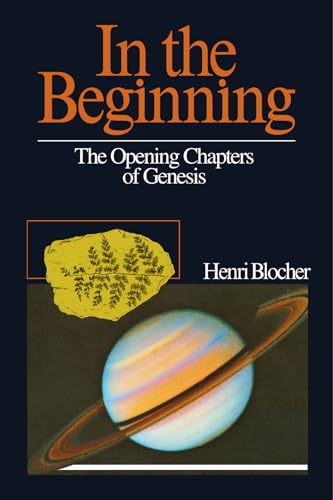In the Beginning: The opening chapters of Genesis
Written by Henri Blocher Reviewed By John WenhamThis is a demanding work but a rewarding one, written by a biblical scholar who is also a systematic theologian. It is not for those who want quick and easy answers to their problems concerning the early chapters of Genesis, but for those who wish to dig deeply into these scriptures. Blocher is quite a difficult writer who has a great deal to say in a small compass. The publishers have sensed the reader’s problem and have used two different founts of type to distinguish the main argument from the numerous more peripheral (but often very interesting) matters for discussion. I strongly recommend that the material in smaller type be omitted on first reading, and be returned to on the second time through.
The author’s sole aim is to grasp the meaning of the original writer and to relate the teaching to the thought of today. He believes that the carefully constructed first three chapters come from a wisdom-writer, whom he boldly identifies as Moses himself. He rightly stresses that the writer knew nothing of twentieth-century science and that modern scientific ideas must not be read into what he writes. It is only after the exegesis has been conscientiously done that we can try to relate our findings to modern knowledge. (He reserves his own attempt for a rather technical and inconclusive appendix which ends on just the right note: faith has such confidence in the Word of God that it can be quite open about its hesitations (e.g., with regard to palaeolithic man) and wait patiently for the clouds to clear.)
This open hesitation can also be applied of course to his own theory of the authorship of Genesis 1. If we totally reject J, E, D and P, as I believe we must, and attribute Exodus to Deuteronomy directly to Moses, Genesis has all the appearance of being pre-Mosaic. Indeed there is much to be said for Genesis 1–11 being pre-Abrahamic, and for the idea that God’s earliest revelation came through theophanies: the God who walked in the garden in the cool of the day himself instructing Adam concerning the creation.
Blocher is entirely committed to verbal inspiration and to the historicity of Genesis, but he is no literalist. He believes that the days of Genesis 1 are neither 24-hour days nor great ages of time, but form a literary framework, leading up to the sabbath rest. Adam’s rib, the upright serpent and the two trees of the garden are not to be taken literally.
His exegesis is thorough and richly satisfying. Having determined the meaning of the text, he illuminates its significance with the help of later writers, biblical and post-biblical. The mind is stretched and the heart moved with the help of thinkers of many schools, providing an awesome insight into the majesty of God, the plight of man and the final victory of grace. The book is a first-class introduction not only to Genesis 1–11 but to the best reformed theology. It is the sort of book which will bear re-reading many times.
John Wenham






